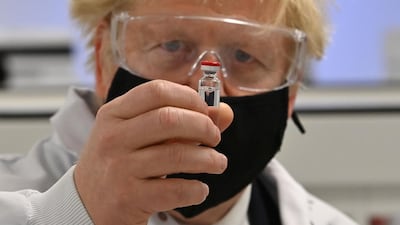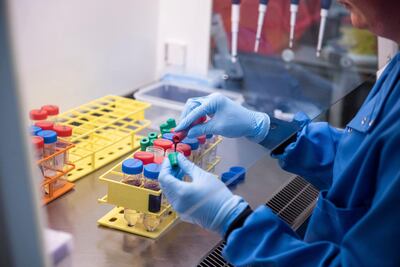The UK faces a “dilemma” over the Oxford/AstraZeneca vaccine which may not be as effective as first thought.
Scientists say key questions remain over the British-made vaccine after final-stage data was published in The Lancet medical journal on Tuesday.
Last month, the developers behind the vaccine announced it was 90 per cent effective among those given a half dose, followed by a full dose a month later.
However, when administered in two full doses the effectiveness rate was just 62 per cent, compared with the Pfizer shot’s 95 per cent efficacy rate.
The overall efficacy was 70 per cent when the two results were pooled.
The Lancet study gave few clues as to why efficacy was lower for trial participants given the full two doses.
Less than 6 per cent of UK trial participants were given the lower dose regimen and none of them was aged over 55, meaning more research will be needed to investigate the vaccine's efficacy in older people, who are particularly susceptible to Covid-19.
AstraZeneca said it would be up to regulators to decide on dosing recommendations based on the data provided.
Simon Clarke, associate professor of cellular microbiology at the University of Reading, said the results are likely to present a “dilemma” for regulators.
He said that while the half-dose regime showed better protection against disease and also in reducing asymptomatic transmission, the group was "relatively small" and did not include older people.
"It remains possible that if the regulators allowed the vaccine to be used in this manner, the most at-risk group may not be protected," he said.
Prof Stephen Evans, of the London School of Hygiene and Tropical Medicine, said the vaccine was safe but its level of effectiveness remained uncertain.
He said: "The basic message that the overall efficacy across the trials that are reported here is about 70 per cent but with a clear description of its uncertainty.
"The statistical uncertainty is that the efficacy could be as low as 55 per cent or as high as 80 per cent. The Pfizer/BioNTech and Moderna vaccines both have efficacies above 90 per cent and are clearly more efficacious under trial conditions."
Prof Sarah Gilbert, lead researcher of the Oxford Vaccine Group, said more data was needed to explain why the lower dosage was more effective but stressed the vaccine was safe.
"What we should take away from it is the vaccine is safe and highly effective," she told BBC Radio 4's Today programme.
“From 21 days of being given the first dose of the vaccine, nobody was admitted to hospital with Covid.”
Once seen as the frontrunner in the development of a vaccine against coronavirus, the British team was overtaken by US pharmaceutical giant Pfizer, whose shots – with a success rate of about 95 per cent – were administered to British pensioners on Tuesday in a world-first hailed as V-Day.
The AstraZeneca/Oxford vaccine is seen as particularly important for tackling the pandemic in the developing world, because it will be cheaper and easier to distribute.
Asked whether the half, then full dose regimen had been a mistake, Andrew Pollard, director of the Oxford Vaccine Group and chief investigator in the trials, said it had been unplanned.
Mene Pangalos of AstraZeneca said he hoped requests for approval from regulators around the world could still be submitted this year.
"We hope that once the regulatory authorities review the data, we can get approval any time from the completion of the submission, which could be any time from the end of this year to early next year," he said.
Prof Pollard conceded the different results from the two-dose regimens complicated matters.
"The regulators will decide exactly what their label should say," he said, when asked whether regulators might approve the two full shots regimen first, and then potentially the half, then full shot regimen when more data is in.
Mr Pangalos also said he assumed US regulators would want to see results from an ongoing trial in the US before giving their approval.
The Oxford researchers said the vaccine was found to be safe, with three out of about 23,700 participants experiencing serious conditions that were possibly related to either the Covid-19 vaccine or a standard meningitis vaccine given to a control group.
A case of a serious neurological illness, transverse myelitis, was reported 14 days after a Covid-19 vaccine booster shot, which was "possibly related to vaccination", they said.
This case led to a seven-week trial suspension in the US and brief halts in trials in other countries.
A case of fever above 40°C occurred in South Africa, but it was not disclosed whether this participant received the vaccine because the person recovered quickly and is continuing the trial without knowledge of the shot received, as is the norm.
Health Secretary Matt Hancock welcomed the news and said the vaccine could be approved by the UK’s independent regulator, the MHRA, in the coming weeks.
He told the BBC: “It has to be a decision for the independent MHRA, who will only approve it if it is safe to use and effective. And I wouldn’t expect anything for the next couple of weeks.”


